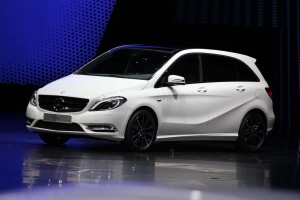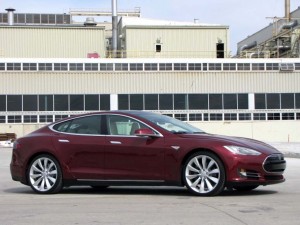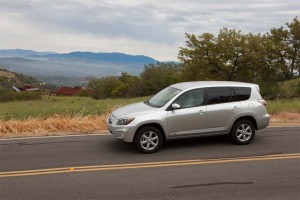The folks at little Tesla Motors are rapidly becoming the go-to guys when a big automaker needs help bringing battery car technology to market, it seems. With Toyota soon to launch the Tesla-powered RAV4-EV reports have surfaced that Mercedes will also tap the California start-ups expertise to bring out a battery-electric version of the next-generation B-Class model.
Though Tesla is counting on its own products – notably including its new Model S sedan – to transform it into a significant automotive player, the company also has been pushing to expand its ties to other automotive manufacturers including Toyota, which has invested $50 million into the smaller firm.
Mercedes and parent Daimler AG have also found it expedient to turn to Tesla, which already has provided battery powertrain know-how to the company’s little Smart car brand, which recently introduced a new electric version of its Smart fortwo. But the B-Class project promises to ramp things up substantially.
“We want to bring another battery-powered vehicle to the market,” a source at Daimler AG, told Germany’s Automobilwoche, which reports that the next electric Mercedes will be based on the subcompact B-Class.
The decision to go with the B-Class model is an intriguing one in that Mercedes has been debating the U.S. market potential for that microvan for several years but had, until now, not been able to come up with a suitable business case.
One plan under study would have been to introduce a plug-in hybrid version of the B-Class. A prototype, dubbed the E-Cell Plus, was revealed at the Frankfurt Motor Show last autumn.
Instead, it appears the maker will shift to a pure battery-electric drivetrain. Specific details were not discussed, but lithium-ion power is all but a certainty.
It remains to be seen if the Mercedes battery car will borrow the same drivetrain now used in the new Model S, which went on sale last month, or if it will adopt an alternative powertrain. That system generates 362 horsepower and 325 lb-ft of torque and reportedly can launch from 0 to 60 in around 6 seconds in sport mode. The Model S is offered with three different sizes of battery packs, with ranges of 160, 230 and 300 miles.
The Toyota RAV4-EV, on the other hand, features a 154-hp engine making 273 lb-ft of torque. Top speed is 100 mph and 0 to 60 comes in around 7 seconds. Range is a more modest 100 miles.
The newest version of the B-Class, featuring conventional gasoline and diesel power, went on sale in Europe last year. Mercedes is planning to bring the B-Class battery car to the U.S. in 2014, according to AutomobilWoche.
The B-Class is one of a number of different products that will be based off Mercedes’ new compact car architecture. The list also will include the all-new, coupe-like CLA sedan, a new crossover and at least four spin-offs of the updated A-Class.
Mercedes has confirmed that it will bring at least one, and possibly several, of those A-Class models to the States. There is a possibility, several sources have told TheDetroitBureau.com, that a battery version of that smaller model could also follow.
The compact architecture, meanwhile, is going to be shared with Daimler alliance partner Renault-Nissan. In turn, a battery-based version of the Infiniti Etherea is reportedly under development, as well. Based on the wildly popular Etherea concept vehicle it will use a drivetrain developed by Nissan, however.
Nissan and partner Renault have been actively cultivating an image of electric vehicle leadership. But Mercedes is pushing into that space, as well, with a variety of electric models under development — notably including an electric version of its gull-winged supercar to be dubbed the SLS E-Cell.



